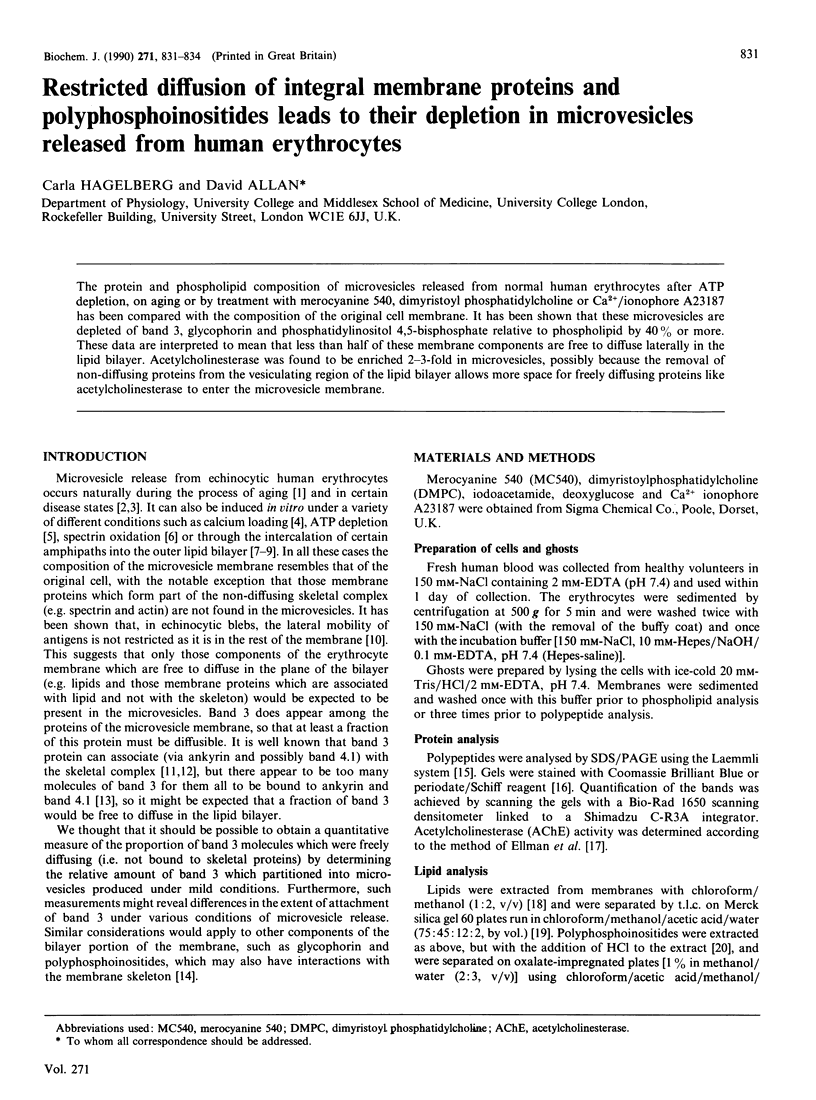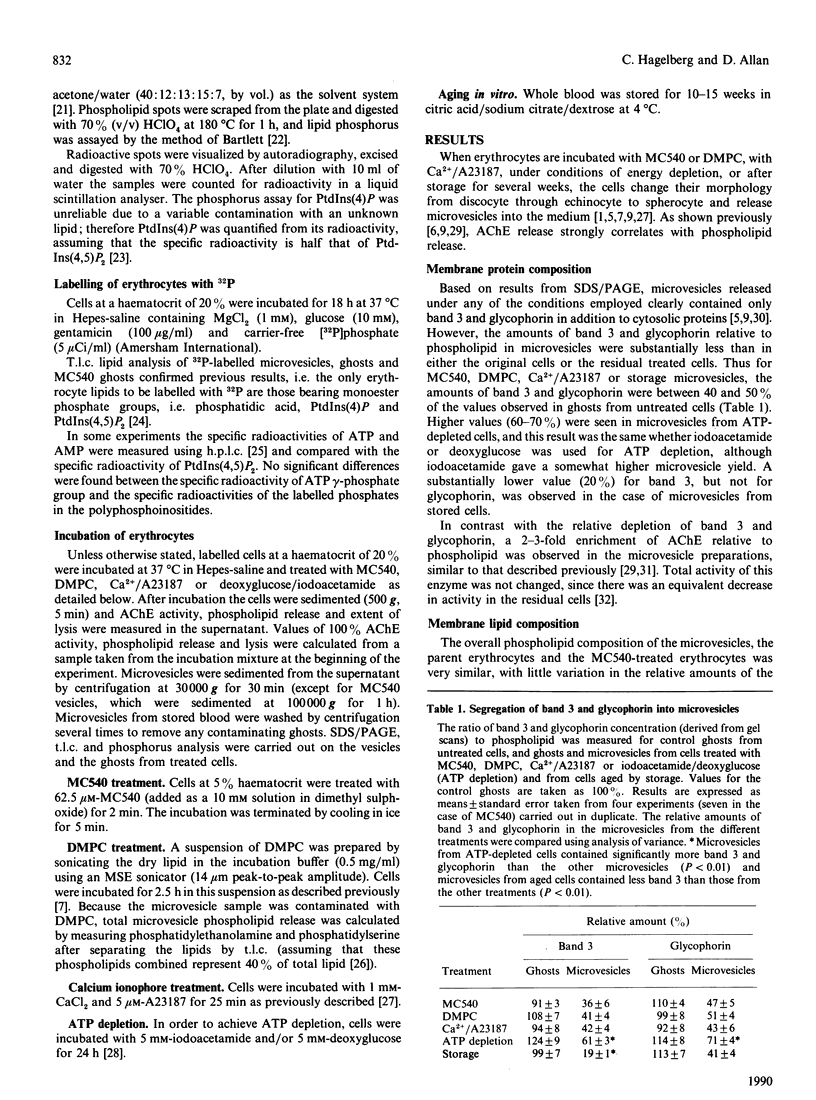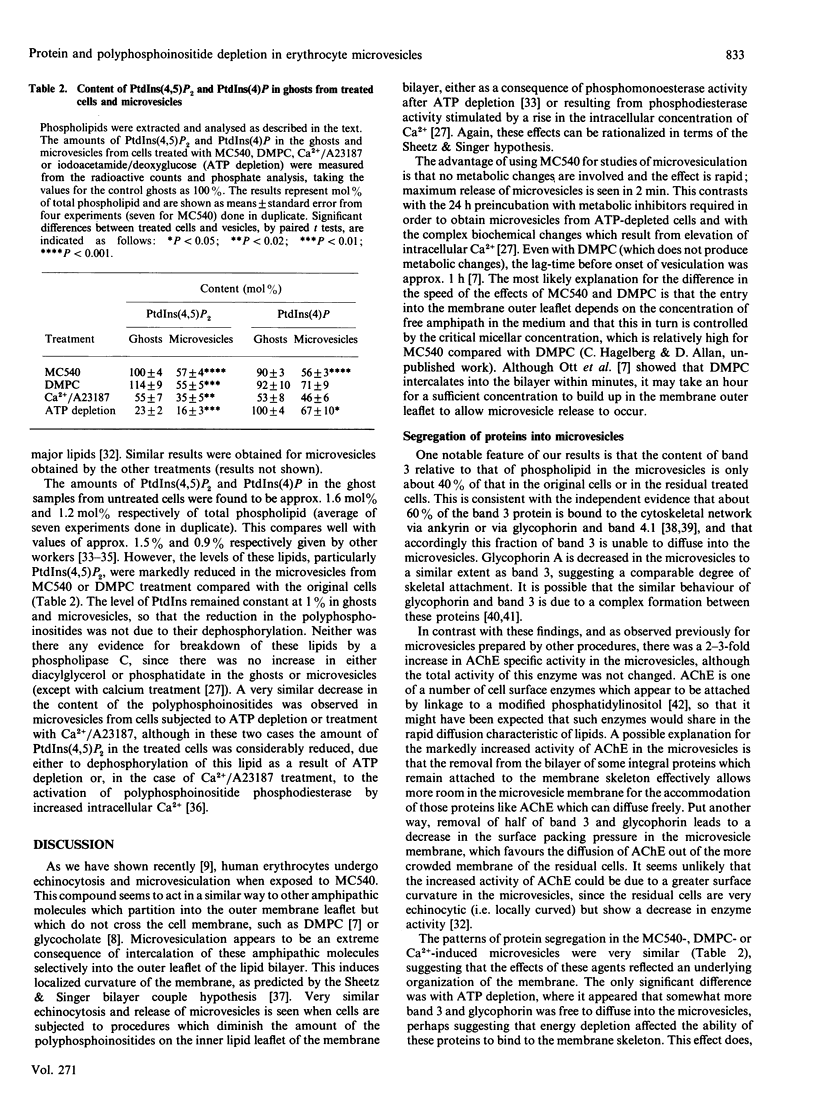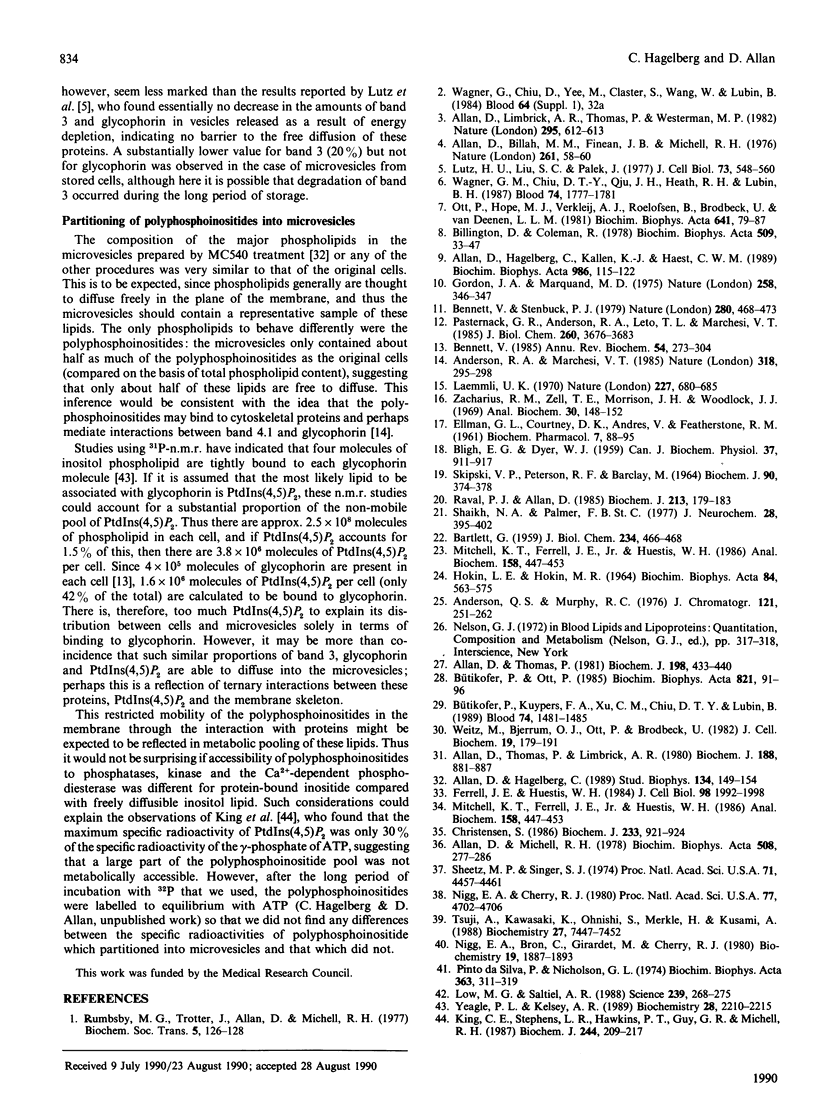Abstract
The protein and phospholipid composition of microvesicles released from normal human erythrocytes after ATP depletion, on aging or by treatment with merocyanine 540, dimyristoyl phosphatidylcholine or Ca2+/ionophore A23187 has been compared with the composition of the original cell membrane. It has been shown that these microvesicles are depleted of band 3, glycophorin and phosphatidylinositol 4,5-bisphosphate relative to phospholipid by 40% or more. These data are interpreted to mean that less than half of these membrane components are free to diffuse laterally in the lipid bilayer. Acetylcholinesterase was found to be enriched 2-3-fold in microvesicles, possibly because the removal of non-diffusing proteins from the vesiculating region of the lipid bilayer allows more space for freely diffusing proteins like acetylcholinesterase to enter the microvesicle membrane.
Full text
PDF



Selected References
These references are in PubMed. This may not be the complete list of references from this article.
- Allan D., Billah M. M., Finean J. B., Michell R. H. Release of diacylglycerol-enriched vesicles from erythrocytes with increased intracellular (Ca2+). Nature. 1976 May 6;261(5555):58–60. doi: 10.1038/261058a0. [DOI] [PubMed] [Google Scholar]
- Allan D., Hagelberg C., Kallen K. J., Haest C. W. Echinocytosis and microvesiculation of human erythrocytes induced by insertion of merocyanine 540 into the outer membrane leaflet. Biochim Biophys Acta. 1989 Nov 17;986(1):115–122. doi: 10.1016/0005-2736(89)90279-4. [DOI] [PubMed] [Google Scholar]
- Allan D., Limbrick A. R., Thomas P., Westerman M. P. Release of spectrin-free spicules on reoxygenation of sickled erythrocytes. Nature. 1982 Feb 18;295(5850):612–613. doi: 10.1038/295612a0. [DOI] [PubMed] [Google Scholar]
- Allan D., Michell R. H. A calcium-activated polyphosphoinositide phosphodiesterase in the plasma membrane of human and rabbit erythrocytes. Biochim Biophys Acta. 1978 Apr 4;508(2):277–286. doi: 10.1016/0005-2736(78)90330-9. [DOI] [PubMed] [Google Scholar]
- Allan D., Thomas P. Ca2+-induced biochemical changes in human erythrocytes and their relation to microvesiculation. Biochem J. 1981 Sep 15;198(3):433–440. doi: 10.1042/bj1980433. [DOI] [PMC free article] [PubMed] [Google Scholar]
- Allan D., Thomas P., Limbrick A. R. The isolation and characterization of 60 nm vesicles ('nanovesicles') produced during ionophore A23187-induced budding of human erythrocytes. Biochem J. 1980 Jun 15;188(3):881–887. doi: 10.1042/bj1880881. [DOI] [PMC free article] [PubMed] [Google Scholar]
- Anderson F. S., Murphy R. C. Isocratic separation of some purine nucleotide, nucleoside, and base metabolites from biological extracts by high-performance liquid chromatography. J Chromatogr. 1976 Jun 23;121(2):251–262. doi: 10.1016/s0021-9673(00)85021-9. [DOI] [PubMed] [Google Scholar]
- Anderson R. A., Marchesi V. T. Regulation of the association of membrane skeletal protein 4.1 with glycophorin by a polyphosphoinositide. Nature. 1985 Nov 21;318(6043):295–298. doi: 10.1038/318295a0. [DOI] [PubMed] [Google Scholar]
- BARTLETT G. R. Phosphorus assay in column chromatography. J Biol Chem. 1959 Mar;234(3):466–468. [PubMed] [Google Scholar]
- BLIGH E. G., DYER W. J. A rapid method of total lipid extraction and purification. Can J Biochem Physiol. 1959 Aug;37(8):911–917. doi: 10.1139/o59-099. [DOI] [PubMed] [Google Scholar]
- Bennett V., Stenbuck P. J. The membrane attachment protein for spectrin is associated with band 3 in human erythrocyte membranes. Nature. 1979 Aug 9;280(5722):468–473. doi: 10.1038/280468a0. [DOI] [PubMed] [Google Scholar]
- Bennett V. The membrane skeleton of human erythrocytes and its implications for more complex cells. Annu Rev Biochem. 1985;54:273–304. doi: 10.1146/annurev.bi.54.070185.001421. [DOI] [PubMed] [Google Scholar]
- Billington D., Coleman R. Effects of bile salts of human erythrocytes. Plasma membrane vesiculation, phospholipid solubilization and their possible relationships to bile secretion. Biochim Biophys Acta. 1978 May 4;509(1):33–47. doi: 10.1016/0005-2736(78)90005-6. [DOI] [PubMed] [Google Scholar]
- Bütikofer P., Kuypers F. A., Xu C. M., Chiu D. T., Lubin B. Enrichment of two glycosyl-phosphatidylinositol-anchored proteins, acetylcholinesterase and decay accelerating factor, in vesicles released from human red blood cells. Blood. 1989 Oct;74(5):1481–1485. [PubMed] [Google Scholar]
- Bütikofer P., Ott P. The influence of cellular ATP levels on dimyristoylphosphatidylcholine-induced release of vesicles from human erythrocytes. Biochim Biophys Acta. 1985 Nov 21;821(1):91–96. doi: 10.1016/0005-2736(85)90158-0. [DOI] [PubMed] [Google Scholar]
- Christensen S. Removal of haem from lipids extracted from intact erythrocytes with particular reference to polyphosphoinositides. Biochem J. 1986 Feb 1;233(3):921–924. doi: 10.1042/bj2330921. [DOI] [PMC free article] [PubMed] [Google Scholar]
- ELLMAN G. L., COURTNEY K. D., ANDRES V., Jr, FEATHER-STONE R. M. A new and rapid colorimetric determination of acetylcholinesterase activity. Biochem Pharmacol. 1961 Jul;7:88–95. doi: 10.1016/0006-2952(61)90145-9. [DOI] [PubMed] [Google Scholar]
- Ferrell J. E., Jr, Huestis W. H. Phosphoinositide metabolism and the morphology of human erythrocytes. J Cell Biol. 1984 Jun;98(6):1992–1998. doi: 10.1083/jcb.98.6.1992. [DOI] [PMC free article] [PubMed] [Google Scholar]
- Gordon J. A., Marquardt M. D. Erythrocyte morphology and clustering of fluorescent anti-A immunoglobulin. Nature. 1975 Nov 27;258(5533):346–347. doi: 10.1038/258346a0. [DOI] [PubMed] [Google Scholar]
- HOKIN L. E., HOKIN M. R. THE INCORPORATION OF 32P FROM TRIPHOSPHATE INTO POLYPHOSPHOINOSITIDES (GAMMA-32P)ADENOSINE AND PHOSPHATIDIC ACID IN ERYTHROCYTE MEMBRANES. Biochim Biophys Acta. 1964 Oct 2;84:563–575. doi: 10.1016/0926-6542(64)90126-x. [DOI] [PubMed] [Google Scholar]
- King C. E., Stephens L. R., Hawkins P. T., Guy G. R., Michell R. H. Multiple metabolic pools of phosphoinositides and phosphatidate in human erythrocytes incubated in a medium that permits rapid transmembrane exchange of phosphate. Biochem J. 1987 May 15;244(1):209–217. doi: 10.1042/bj2440209. [DOI] [PMC free article] [PubMed] [Google Scholar]
- Laemmli U. K. Cleavage of structural proteins during the assembly of the head of bacteriophage T4. Nature. 1970 Aug 15;227(5259):680–685. doi: 10.1038/227680a0. [DOI] [PubMed] [Google Scholar]
- Low M. G., Saltiel A. R. Structural and functional roles of glycosyl-phosphatidylinositol in membranes. Science. 1988 Jan 15;239(4837):268–275. doi: 10.1126/science.3276003. [DOI] [PubMed] [Google Scholar]
- Lutz H. U., Liu S. C., Palek J. Release of spectrin-free vesicles from human erythrocytes during ATP depletion. I. Characterization of spectrin-free vesicles. J Cell Biol. 1977 Jun;73(3):548–560. doi: 10.1083/jcb.73.3.548. [DOI] [PMC free article] [PubMed] [Google Scholar]
- Mitchell K. T., Ferrell J. E., Jr, Huestis W. H. Separation of phosphoinositides and other phospholipids by two-dimensional thin-layer chromatography. Anal Biochem. 1986 Nov 1;158(2):447–453. doi: 10.1016/0003-2697(86)90574-9. [DOI] [PubMed] [Google Scholar]
- Mitchell K. T., Ferrell J. E., Jr, Huestis W. H. Separation of phosphoinositides and other phospholipids by two-dimensional thin-layer chromatography. Anal Biochem. 1986 Nov 1;158(2):447–453. doi: 10.1016/0003-2697(86)90574-9. [DOI] [PubMed] [Google Scholar]
- Nigg E. A., Bron C., Girardet M., Cherry R. J. Band 3-glycophorin A association in erythrocyte membrane demonstrated by combining protein diffusion measurements with antibody-induced cross-linking. Biochemistry. 1980 Apr 29;19(9):1887–1893. doi: 10.1021/bi00550a024. [DOI] [PubMed] [Google Scholar]
- Nigg E. A., Cherry R. J. Anchorage of a band 3 population at the erythrocyte cytoplasmic membrane surface: protein rotational diffusion measurements. Proc Natl Acad Sci U S A. 1980 Aug;77(8):4702–4706. doi: 10.1073/pnas.77.8.4702. [DOI] [PMC free article] [PubMed] [Google Scholar]
- Ott P., Hope M. J., Verkleij A. J., Roelofsen B., Brodbeck U., van Deenen L. L. Effect of dimyristoyl phosphatidylcholine on intact erythrocytes. Release of spectrin-free vesicles without ATP depletion. Biochim Biophys Acta. 1981 Feb 20;641(1):79–87. doi: 10.1016/0005-2736(81)90570-8. [DOI] [PubMed] [Google Scholar]
- Pasternack G. R., Anderson R. A., Leto T. L., Marchesi V. T. Interactions between protein 4.1 and band 3. An alternative binding site for an element of the membrane skeleton. J Biol Chem. 1985 Mar 25;260(6):3676–3683. [PubMed] [Google Scholar]
- Raval P. J., Allan D. Ca2+-induced polyphosphoinositide breakdown due to phosphomonoesterase activity in chicken erythrocytes. Biochem J. 1985 Oct 1;231(1):179–183. doi: 10.1042/bj2310179. [DOI] [PMC free article] [PubMed] [Google Scholar]
- Rumsby M. G., Trotter J., Allan D., Michell R. H. Recovery of membrane micro-vesicles from human erythrocytes stored for transfusion: a mechanism for the erythrocyte discocyte-to-spherocyte shape transformation. Biochem Soc Trans. 1977;5(1):126–128. doi: 10.1042/bst0050126. [DOI] [PubMed] [Google Scholar]
- Shaikh N. A., Palmer F. B. Phosphoinositide kinases in chick brain and sciatic nerve, a developmental study. J Neurochem. 1977 Feb;28(2):395–402. doi: 10.1111/j.1471-4159.1977.tb07760.x. [DOI] [PubMed] [Google Scholar]
- Sheetz M. P., Singer S. J. Biological membranes as bilayer couples. A molecular mechanism of drug-erythrocyte interactions. Proc Natl Acad Sci U S A. 1974 Nov;71(11):4457–4461. doi: 10.1073/pnas.71.11.4457. [DOI] [PMC free article] [PubMed] [Google Scholar]
- Skipski V. P., Peterson R. F., Barclay M. Quantitative analysis of phospholipids by thin-layer chromatography. Biochem J. 1964 Feb;90(2):374–378. doi: 10.1042/bj0900374. [DOI] [PMC free article] [PubMed] [Google Scholar]
- Tsuji A., Kawasaki K., Ohnishi S., Merkle H., Kusumi A. Regulation of band 3 mobilities in erythrocyte ghost membranes by protein association and cytoskeletal meshwork. Biochemistry. 1988 Sep 20;27(19):7447–7452. doi: 10.1021/bi00419a041. [DOI] [PubMed] [Google Scholar]
- Wagner G. M., Chiu D. T., Qju J. H., Heath R. H., Lubin B. H. Spectrin oxidation correlates with membrane vesiculation in stored RBCs. Blood. 1987 Jun;69(6):1777–1781. [PubMed] [Google Scholar]
- Weitz M., Bjerrum O. J., Ott P., Brodbeck U. Quantitative composition and characterization of the proteins in membrane vesicles released from erythrocytes by dimyristoylphosphatidylcholine. A membrane system without cytoskeleton. J Cell Biochem. 1982;19(2):179–191. doi: 10.1002/jcb.240190208. [DOI] [PubMed] [Google Scholar]
- Yeagle P. L., Kelsey D. Phosphorus nuclear magnetic resonance studies of lipid-protein interactions: human erythrocyte glycophorin and phospholipids. Biochemistry. 1989 Mar 7;28(5):2210–2215. doi: 10.1021/bi00431a036. [DOI] [PubMed] [Google Scholar]
- Zacharius R. M., Zell T. E., Morrison J. H., Woodlock J. J. Glycoprotein staining following electrophoresis on acrylamide gels. Anal Biochem. 1969 Jul;30(1):148–152. doi: 10.1016/0003-2697(69)90383-2. [DOI] [PubMed] [Google Scholar]


